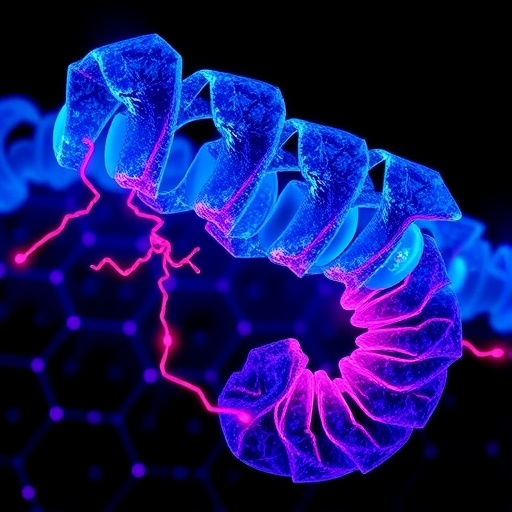In a groundbreaking study that sheds light on the intricate relationship between metabolism and tumor progression in colorectal cancer, researchers led by Liu et al. have unveiled a multifaceted analysis that connects mannose phosphate isomerase to hypoxia-induced angiogenesis. This research, published in the Journal of Translational Medicine, presents an extensive deep-dive into the molecular underpinnings of how certain enzymes can influence the proliferation and survival of cancer cells under low oxygen conditions, highlighting a potentially pivotal aspect of cancer biology.
The study represents a significant step forward in the application of multi-omics approaches to cancer research, integrating genomic, transcriptomic, and proteomic data to paint a comprehensive picture of the metabolic alterations that facilitate tumor growth in hypoxic regions. The researchers meticulously gathered and analyzed data from various colorectal cancer tissues and cell lines, providing a robust basis for their findings. By revealing the roles of specific metabolic enzymes, such as mannose phosphate isomerase, they offer new insights that could inform therapeutic strategies aimed at disrupting the metabolic adaptations of tumors.
Hypoxia, a condition characterized by inadequate oxygen supply, is a defining feature of many solid tumors, including colorectal cancer. The tumor microenvironment often exhibits erratic blood supply, leading to localized hypoxic areas that drive a unique set of biological responses. The angiogenic switch is a crucial process in tumor progression, facilitating increased blood vessel formation to sustain tumor growth. The research underscores how the enzyme mannose phosphate isomerase plays a critical role in this hypoxia-driven angiogenesis, potentially serving as a new biomarker for disease progression and treatment response.
In the quest to understand the molecular mechanisms underlying these phenomena, Liu and colleagues conducted a series of comprehensive experiments. Utilizing patient-derived samples, they identified a distinct metabolic signature associated with hypoxia-induced angiogenesis, providing key insights into how tumors manipulate their microenvironments. The link between metabolic reprogramming and angiogenesis highlights the need to reconsider our therapeutic strategies, focusing not just on targeting the tumor directly, but also on disrupting the supportive environment that enables it to thrive.
The findings suggest that the expression levels of mannose phosphate isomerase correlate closely with angiogenic markers and hypoxic conditions in colorectal cancer. This correlation opens up new avenues for the development of diagnostic tools that could help delineate patients who are at higher risk for aggressive disease phenotypes. By leveraging multi-omics techniques, the researchers were able to present a holistic view of how these biological processes interact at a cellular level, ushering in a new era for personalized medicine approaches in oncology.
Intriguingly, this research also lays the groundwork for future studies aimed at translating these findings into clinical applications. By targeting mannose phosphate isomerase, it might be possible to develop novel therapeutic avenues that specifically disrupt the metabolic pathways exploited by tumors during hypoxic conditions. Such approaches could enhance the efficacy of existing therapies and potentially overcome resistance mechanisms commonly encountered in colorectal cancer treatment.
Furthermore, the implications of this study extend beyond colorectal cancer alone, as the described mechanisms of hypoxia-induced angiogenesis and metabolic adaptation might be relevant to a variety of malignancies. This universality emphasizes the importance of understanding metabolic dependencies across cancer types, making such research immensely valuable in the concerted efforts against cancer.
Overall, Liu et al.’s work exemplifies the potential of integrating multi-omics data in cancer research, providing a foundation for future studies aimed at unraveling the complex interactions between metabolism, hypoxia, and angiogenesis. By prioritizing such advanced methodologies, researchers can further our understanding of cancer progression, potentially leading to the development of more effective and personalized therapeutic strategies.
As the landscape of cancer research continues to evolve, the need for innovative approaches to tackle the multifactorial nature of this disease becomes increasingly apparent. The insights gained from this study present not just a paradigm shift in our understanding of colorectal cancer biology, but also a clarion call for the scientific community to embrace the complexities of tumor metabolism when designing future studies and clinical interventions.
In conclusion, the promise held within the findings presented by Liu and colleagues offers hope for advancements in the early detection and treatment of colorectal cancer, underscoring the urgency of further investigation into the processes that allow tumors to not just survive but flourish under adverse conditions. Their pioneering work illuminates a path forward, one that may ultimately lead to improved patient outcomes in the battle against cancer.
Subject of Research: Colorectal cancer, hypoxia-induced angiogenesis, and mannose phosphate isomerase.
Article Title: Multi-omics analyses identify mannose phosphate isomerase-centered hypoxia-induced angiogenesis signature in colorectal cancer.
Article References: Liu, S., Zhang, Y., Meng, Y. et al. Multi-omics analyses identify mannose phosphate isomerase-centered hypoxia-induced angiogenesis signature in colorectal cancer. J Transl Med 23, 1246 (2025). https://doi.org/10.1186/s12967-025-07291-8
Image Credits: AI Generated
DOI: https://doi.org/10.1186/s12967-025-07291-8
Keywords: Colorectal cancer, hypoxia, angiogenesis, metabolism, mannose phosphate isomerase, multi-omics analysis, cancer biology.
Tags: cancer cell proliferation under low oxygencolorectal cancer angiogenesis mechanismscolorectal cancer metabolic adaptationsenzymatic roles in cancer biologygenomic and proteomic analysis in cancerhypoxia-induced tumor progressionhypoxic regions in solid tumorsmannose phosphate isomerase in cancermetabolic alterations in tumorsmulti-omics approaches in cancer researchtherapeutic strategies for colorectal cancertumor microenvironment and oxygen supply





